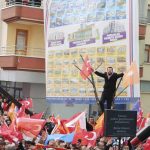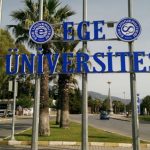By umit Ozkirimli
Someone must have been telling lies about Josef K., he knew he had done nothing wrong but, one morning, he was arrested.
“Since [Osman K.] travelled to Hungary on 05.04.2013 with flight number TK 1035, seat 8D and travelled back from Hungary to our country [Turkey] on 06.04.2013 with flight number TK 1036, seat 11B, since one of the suspects, Gökçe Tüylüoğlu, also travelled to Hungary on 05.04.2013 with flight number TK 1035, seat 8C and travelled back from Hungary to our country on 06.04.2013 with flight number TK 1036, seat 11C, since this travel took place just before Gezi insurgency activities, and since it is known that George Soros, the founder of Open Society Foundation, has engaged in intensive activities in this country and had to move his university in this country for similar activities while this indictment was being prepared, it is understood that the suspects’ visit was among coordination activities for the Gezi insurgency demonstrations.”
“No,” said the man at the window, who threw his book down on a coffee table and stood up. “You can’t go away when you’re under arrest.” “That’s how it seems,” said K. “And why am I under arrest?” he then asked. “That’s something we’re not allowed to tell you. Go into your room and wait there. Proceedings are underway and you’ll learn about everything all in good time.”
“When the 198 methods of non-violent action included in Gene Sharp’s book entitled ‘From Dictatorship to Democracy’ are compared to events that took place during Gezi revolts; 198 Methods of Non-Violent Action: The Methods of Non-Violent Protest and Persuasion (selected ones, UÖ):
12. Skywriting and earthwriting
14. Mock awards
20. Prayer and worship (Dinners named “earth iftars” were organised on Istiklal Street during Ramadan fast and Ziya Azazi supported protestors with his Mevlevi dance)
33. Befriending (During Gezi protests some protestors were engaged in activities like giving flowers to police forces).
35. Humorous skits and pranks
36. Performance of plays and music ([Turkish] Music groups like Kardeş Türküler and Duman wrote songs. During Roger Water’s Istanbul performance as part of his “The Wall” concert tour, the photographs of the people who died during the revolts were reflected on the screen.)
37. Singing
51. Walk-outs (Strike actions of KESK, DISK, and other labour unions during Gezi insurgency)
52. Silence
57. Lysistratic nonaction (Ex: refusing to have sex with partner)
65. Stay-at-home (During the events, Mehmet Ali Alabora and some other people linked to theatre play Mi Minör stayed at home for some time)
69. Collective disappearance
135. Popular non-obedience
167. Pray-in (Anti-capitalist Muslims held Friday prayers in Gezi Park.)
188. Dumping
195. Seeking imprisonment
196. Civil disobedience of ‘neutral’ laws”
“There is no doubt,” he said quietly, “that there is some enormous organisation determining what is said by this court. In my case this includes my arrest and the examination taking place here today, an organisation that employs policemen who can be bribed, oafish supervisors and judges of whom nothing better can be said than that they are not as arrogant as some others. This organisation even maintains a high-level judiciary along with its train of countless servants, scribes, policemen and all the other assistance that it needs, perhaps even executioners and torturers – I’m not afraid of using those words. And what, gentlemen, is the purpose of this enormous organisation?”
“It is understood that, within this framework, George Soros was the international leg of this and similar operations, whereas the structure led and coordinated by the suspect [Osman K.] tried to use this situation, and made use of the pressure exerted by foreign countries with the aim of forcing the government of the Turkish Republic to resign, and in case that attempt was not successful, as seen in examples in other countries, hid weapons for use with the aim of creating an environment that is parallel to civil war scenarios.”
“Given that the insurgency had been planned since 2011, it had been rehearsed in universities, theatres, and other places, and had similarities to the actions that were designed for successful insurgencies in other countries, and taking into account the process, format, and extent of the events that took place, it becomes obvious that the organisation that is being investigated is not an ordinary group of people; to the contrary, it is a collective body that had become organised long before Gezi insurgency, that behaved in a planned way, financed by accomplices in the country and abroad, with a wide spectrum of stakeholders with legal and illegal purposes from NGOs to private companies and a wide range of ideas that even went to the extent of attempting to establish media outlets to be used so as to ensure that the insurgency accomplished its aims, that had the ability to bring together stakeholders from different ideologies to commit the intended offence.”
“All that I want is a public discussion of a public wrong. Listen: ten days ago I was placed under arrest, the arrest itself is something I laugh about but that’s beside the point. They came for me in the morning when I was still in bed. Maybe the order had been given to arrest some house painter – that seems possible after what the judge has said – someone who is as innocent as I am, but it was me they chose.”
“It is well known that George Soros had provided financial support to mass protests in the Middle East and Baltic countries that are labelled as “liberal actions” and that the organisation Otpor led by Ivan Marovic was at the forefront of this insurgency. This person transferred money to the suspect [Osman K.] through his link in Turkey, the Open Society Foundation.”
“You still don’t seem to have much general idea of what the court’s about,” said the painter, who had stretched his legs wide apart and was tapping loudly on the floor with the tip of his foot. “But as you’re innocent you won’t need it anyway. I’ll get you out of this by myself.” “How do you intend to do that?” asked K. “You did say yourself not long ago that it’s quite impossible to go to the court with reasons and proofs.” “Only impossible for reasons and proofs you take to the court yourself,” said the painter, raising his forefinger as if K. had failed to notice a fine distinction. “It goes differently if you try to do something behind the public court, that’s to say in the consultation rooms, in the corridors or here, for instance, in my studio.”
“It is confirmed that this person [Osman K.] finances the people who participated in those events, opened a bank account to provide for the materials to be used in the protests, and provided materials like gas masks, goggles, milk that the protestors used while clashing with the police, as well as food and breakfast for the protestors and tables, sounds systems, and etc. to be used in the Gezi park.”
“In that context, it is found that,[Osman K.], the leading actor of the movement and the organisation inside the country and other suspects, as part of their attempts to overthrow the government of the Turkish Republic or to prevent it from fulfilling its duties, with the aim of ‘spreading the soul of the Gezi to Anatolia by keeping it alive and deepening it’, organised various meetings, forums, events, and activities, and even tried to establish a television channel after the insurgency started and thereafter.”
“You are Josef K.,” said the priest, and raised his hand from the balustrade to make a gesture whose meaning was unclear… “You have been accused,” said the priest, especially gently. “Yes,” said K., “so I have been informed.” (…) “Do you know your case is going badly?” asked the priest. “That’s how it seems to me too,” said K. “I’ve expended a lot of effort on it, but so far with no result. Although I do still have some documents to submit.” “How do you imagine it will end?” asked the priest. “At first I thought it was bound to end well,” said K., “but now I have my doubts about it. I don’t know how it will end. Do you know?” “I don’t,” said the priest, “but I fear it will end badly. You are considered guilty. Your case will probably not even go beyond a minor court. Provisionally at least, your guilt is seen as proven.” “But I’m not guilty,” said K., “there’s been a mistake. How is it even possible for someone to be guilty. We’re all human beings here, one like the other.” “That is true,” said the priest, “but that is how the guilty speak.”
“Moreover, Article 312 of the Turkish Penal Code; Offences against the Government 312- (1) stipulates that any person attempting, by the use of force and violence, to abolish the government of the Republic of Turkey or to prevent it, in part or in full, from fulfilling its duties, shall be sentenced to a penalty of aggravated life imprisonment. In that context it is imperative that all of the suspects are terror offenders and their acts constitute a terror offence.”
The logic cannot be refuted, but someone who wants to live will not resist it. Where was the judge he’d never seen? Where was the high court he had never reached? He raised both hands and spread out all his fingers. But the hands of one of the gentleman were laid on K.’s throat, while the other pushed the knife deep into his heart and twisted it there, twice. As his eyesight failed, K. saw the two gentlemen cheek by cheek, close in front of his face, watching the result. “Like a dog!” he said, it was as if the shame of it should outlive him.
All excerpts taken from Franz Kafka’s novel The Trial and from the Gezi indictment , with Osman K. referring to Mehmet Osman Kavala.
Source: ahval News



